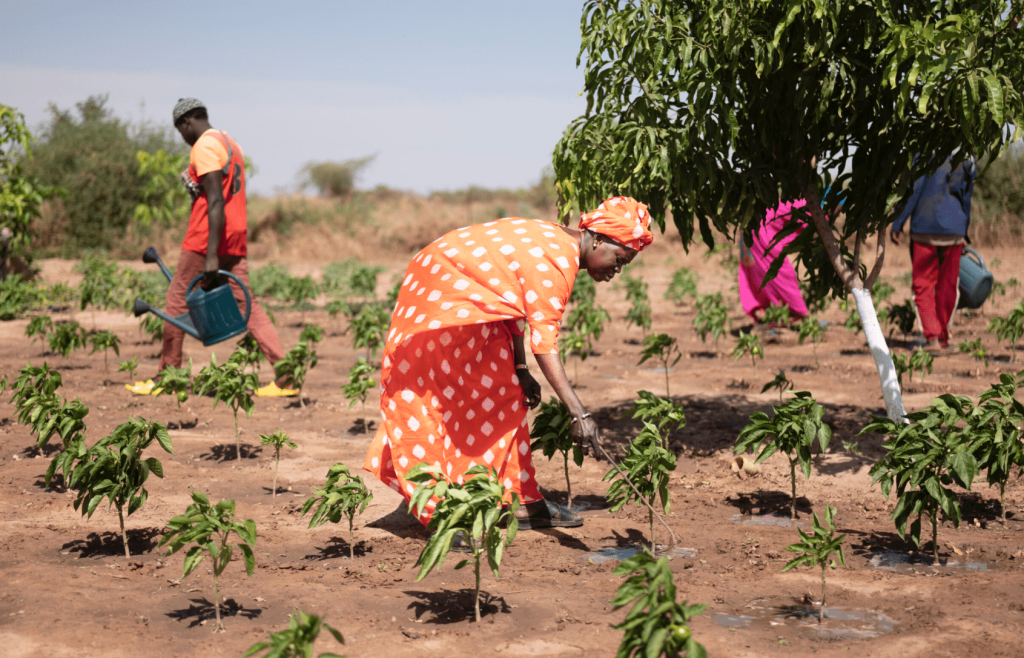A study by a private organisation has suggested measures to be taken by the authorities to avert what it described as a looming danger in the food sector in the coming year. The report commissioned by AFEX, a commodity trade solutions company, has recommended measures for the federal government to address price volatility in the food sector to stabilize the economy.
It is the AFEX 2024 wet season report, which projected a 13 percent decline in the production of some staple foods. The fears expressed by the report is that if this should happen it has the tendency to drive up prices in 2025. That, sadly, will negate the projection of the federal government towards reaping massive harvest of food items in 2025, therefore driving down the food inflation that afflicted the country since the removal of subsidy in 2023.
The report noted that Nigeria’s food system is under immense pressure, facing a combination of factors such as insecurity, macroeconomic instability, and the escalating impacts of climate change.
Earlier, the Cadre Harmonisé Report for October projected that at least 33.1 million people in 26 states and the FCT would face a food and nutrition crisis between June and August 2025.
AFEX noted that price volatility is prominent in the agricultural sector, where unexpected production shortfalls (supply shocks), pests and diseases, geopolitical crises, concentrated production in specific regions, trade restrictions, exchange rates, global macroeconomic conditions, and climate change contribute to food insecurity and price instability.
As one of the countries most vulnerable to climate change, Nigeria frequently experiences natural disasters, including floods and droughts in both its northern and southern regions, which further strain its agricultural sector.
This vulnerability, AFEX said, is reflected in Nigeria’s low ranking of 152nd out of 187 countries on the Notre Dame Global Adaptation Initiative Index, which measures susceptibility to climate change.
“Excessive price volatility has severe consequences, particularly regarding hunger, malnutrition, and poverty, which, in turn, escalate food insecurity.
“The broader economic effects are also significant, influencing fluctuations in exchange rates, capital flows, terms of trade, and revenue streams. These disruptions can hinder agricultural commodities markets, where farmers, agribusinesses, and consumers are at high risk in today’s economy.
“These challenges have led to food scarcity, malnutrition, health crises—especially among children—and rising food prices, worsening the country’s food insecurity,” AFEX said.
It emphasised the need to address these issues to manage commodity price volatility effectively. I. The opinion of the firm, given Nigeria’s current food insecurity and the likelihood of global shocks in the coming years, it is crucial to adopt strategies that mitigate these impacts.
Towards this, AFEX outlined solutions and urged the federal government to implement the “Derivatives, Commodity Exchanges, and Commodities-Linked Bonds” approaches.
On derivatives, the report stated: “Financial contracts whose value is derived from the performance of an underlying asset can help Nigeria manage the risks associated with commodity price volatility. These contracts involve an agreement between two entities to buy or sell the underlying assets at a specific date and price. Derivative contracts include forwards, futures, options, and swaps.”
Options give the buyer the right (but not the obligation) to buy (call option) or sell (put option) an asset at a specific price on or before a certain date. The seller of the option is obligated to fulfill the terms of the contract if the buyer exercises the option.
Swaps allow two counterparties to exchange a series of cash payments over a stated period. These periodic payments can be based on fixed or floating interest rates, depending on the contract terms. Swaps offer flexibility and enable market participants to customize risk management strategies to suit specific needs.
Forward and futures contracts involve agreements to buy or sell a specific quantity of an asset at a specified price, with delivery set for a future date.
Addressing the Commodity Exchange approach, AFEX explained, “These centralized marketplaces facilitate the trading of a wide range of commodities and standardized contracts, including futures, options, and spot contracts. Commodities exchanges enable participants to purchase fixed quantities of commodities for future delivery, providing opportunities for traders to capitalize on periods of high volatility.”
“Among the various types of contracts traded, spot and futures contracts are the most common, offering protection against price fluctuations caused by factors such as weather, seasonal production variations, and stock fluctuations.”
“By employing diverse trading strategies on the exchange, commodity traders can take advantage of price fluctuations to maximize their profits.”
AFEX also noted that commodities-linked bonds are fixed-income securities with returns tied to the price of a specific commodity or commodity index.
“These instruments offer investors the opportunity to gain exposure to commodity markets while receiving fixed interest payments. By incorporating commodity-linked bonds into their portfolios, investors can hedge against inflation and fluctuations in commodity prices, diversifying their investments beyond traditional fixed-income assets.”
AFEX further recommended enhancing the capacity of farmers and investors to manage price risks, which is essential for making significant improvements in the country’s food security levels.

